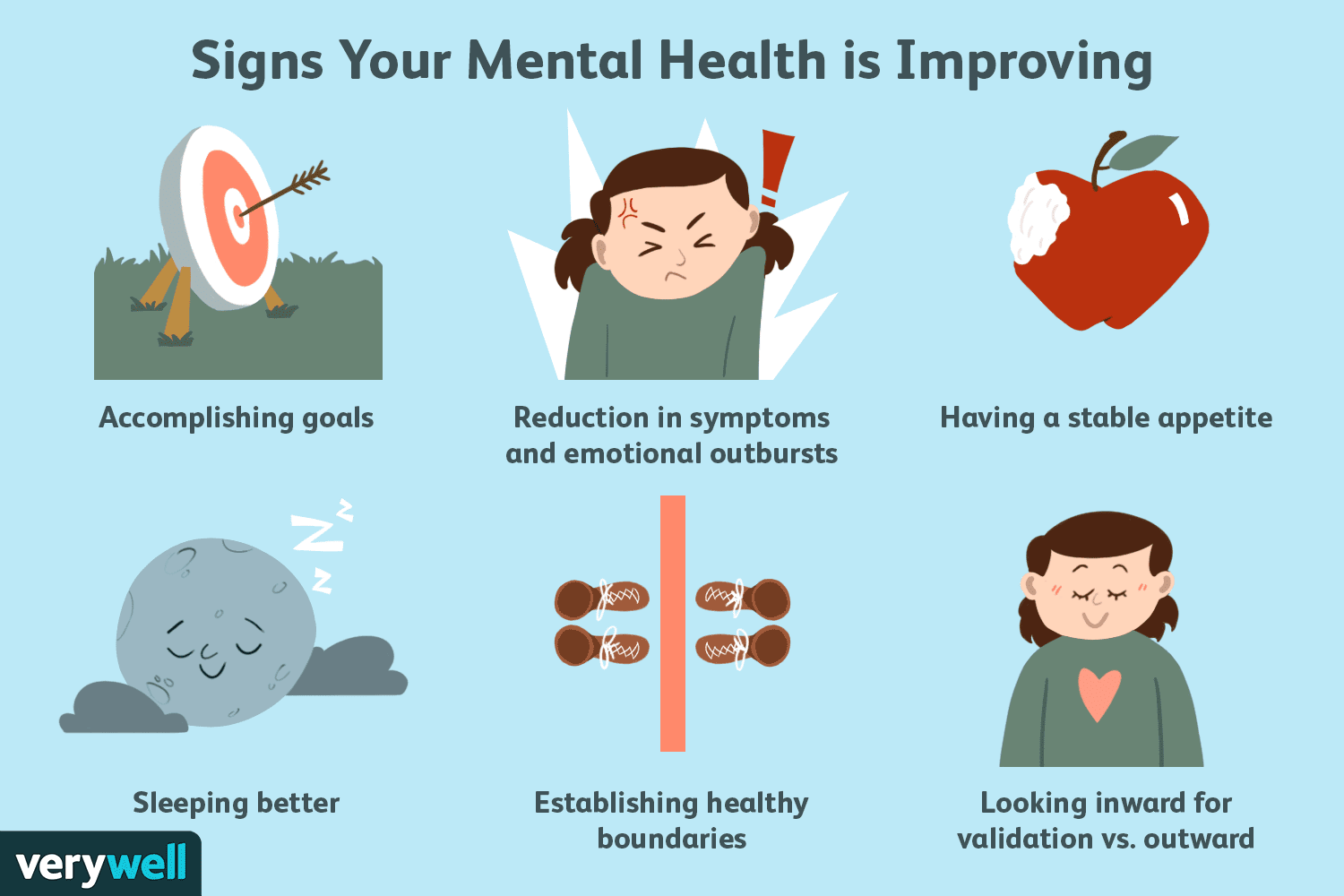
Feeling overwhelmed? Struggling to maintain a healthy state of mind? Look no further than “How Can I Improve My Mental Health?” This extraordinary product offers invaluable insights and effective strategies for enhancing your mental well-being. With its comprehensive approach and user-friendly features, it’s no wonder that individuals worldwide are turning to this revolutionary tool for guidance. Say goodbye to the lows and embrace a life of positivity and emotional resilience with “How Can I Improve My Mental Health?”
Exercise Regularly
Exercise is not only beneficial for your physical health but also plays a crucial role in improving your mental well-being. Regular cardiovascular exercises, such as running, cycling, or swimming, can help release endorphins, which are known as “feel-good” hormones. These exercises also stimulate the production of brain chemicals like serotonin and dopamine, which are associated with improved mood and reduced symptoms of depression and anxiety.
In addition to cardiovascular exercises, incorporating strength training into your routine can have numerous mental health benefits. Building muscle strength and improving overall fitness can boost self-confidence and self-esteem, leading to a more positive outlook on life. Strength training also releases endorphins and helps regulate stress hormones, resulting in a calmer and more focused mind.
Another form of exercise that can significantly contribute to your mental health is practicing yoga and meditation. These activities promote mindfulness and relaxation, helping to reduce stress and anxiety. Yoga combines physical movements with breathing techniques, while meditation involves focusing and calming the mind. Both practices have been proven to enhance mental clarity, reduce symptoms of depression, and improve overall emotional well-being.
Develop Healthy Eating Habits
Maintaining a balanced diet is essential for both your physical and mental health. Consuming a variety of nutrient-rich foods can provide the necessary vitamins and minerals needed for optimal brain function. Incorporate fruits, vegetables, whole grains, lean proteins, and healthy fats into your meals to ensure you’re fueling your body and mind.
Hydration is also key to a healthy mind. Dehydration can lead to fatigue, low mood, and difficulty concentrating, so make sure you’re drinking enough water throughout the day. Avoid excessive caffeine consumption, as it can disrupt sleep patterns and increase feelings of anxiety or restlessness.
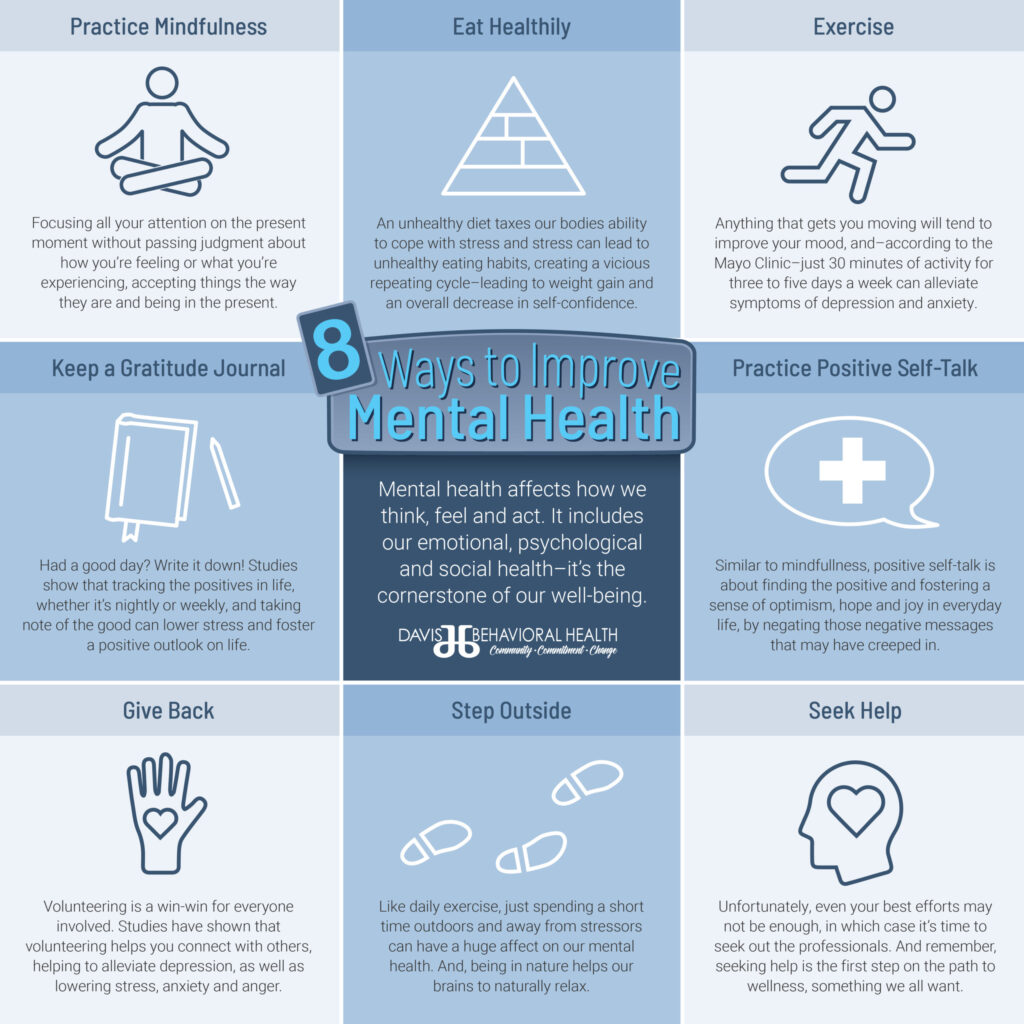
This image is property of www.dbhutah.org.
Get Enough Sleep
Adequate sleep is crucial for good mental health. Establish a bedtime routine that allows for relaxation and signals to your body that it’s time to unwind. This could include activities like reading a book, taking a warm bath, or practicing deep breathing exercises. Avoid using electronic devices, such as smartphones or laptops, before bed, as the blue light emitted from these screens can interfere with your sleep-wake cycle.
Creating a comfortable sleep environment is also important. Keep your bedroom dark, cool, and quiet to promote uninterrupted rest. Invest in a comfortable mattress and pillows that provide proper support for your body. By prioritizing quality sleep, you’ll enhance cognitive function, improve mood, and have better overall mental well-being.
Practice Self-Care
Engaging in activities that bring you joy and relaxation is essential for maintaining good mental health. Make time for hobbies, interests, and activities that you enjoy. This could be anything from painting and playing an instrument to gardening or hiking. By participating in activities that bring you happiness, you’ll increase feelings of fulfillment and reduce stress levels.
Taking regular breaks and allowing yourself time to rest is equally important. Overworking and burnout can have detrimental effects on your mental health. Schedule regular breaks throughout the day, take short walks, or practice mindfulness exercises to recharge your energy and clear your mind.
Setting boundaries is an integral part of self-care. Learn to prioritize yourself and say no when necessary. It’s okay to set limits on your time, energy, and commitments. Establishing healthy boundaries helps reduce stress and ensures you’re taking care of your mental well-being.
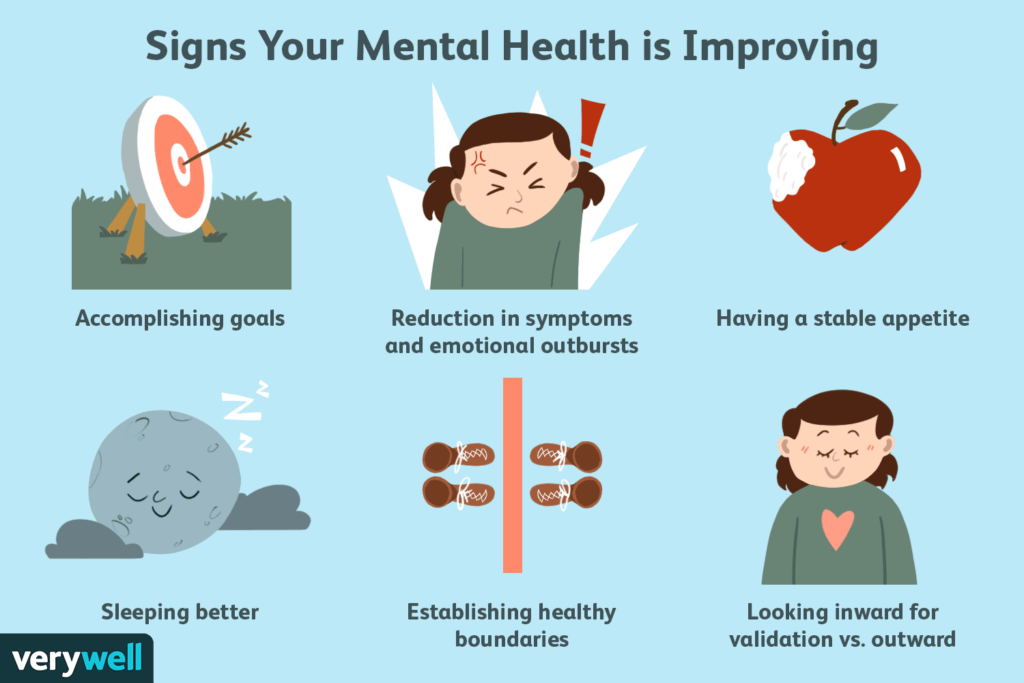
This image is property of www.verywellmind.com.
Manage Stress Levels
Stress can have a significant impact on your mental health, so it’s crucial to identify stress triggers and find healthy ways to manage and reduce them. Pay attention to situations, people, or circumstances that cause stress and try to minimize exposure to them whenever possible. If certain responsibilities or obligations are causing excessive stress, explore ways to delegate or find alternative solutions.
Practicing stress-reducing techniques can also help. This could include deep breathing exercises, mindfulness meditation, progressive muscle relaxation, or engaging in hobbies that relax you. Regularly incorporating these techniques into your lifestyle will help you cope with stress more effectively and maintain better mental well-being.
Remember that seeking support from friends and family is essential when managing stress. Don’t hesitate to reach out and share your concerns or worries with loved ones. Social support can provide a helpful perspective, emotional comfort, and practical assistance when facing stressful situations.
Engage in Social Activities
Social connections play a vital role in maintaining good mental health. Joining clubs or organizations that align with your interests can provide opportunities to meet new people and build meaningful relationships. Participating in group activities or sports can also contribute to a sense of belonging and enhance your overall well-being.
Making plans with friends and family is another excellent way to nurture your social connections. Regularly scheduling activities together, such as going out for a meal, watching a movie, or engaging in a shared hobby, can strengthen relationships and provide a source of support and enjoyment.
Volunteering for community initiatives is another way to engage socially while also giving back. Helping others can bring a sense of purpose, boost self-esteem, and create a positive impact on both your mental and emotional well-being. Look for local volunteer opportunities that align with your values and interests.
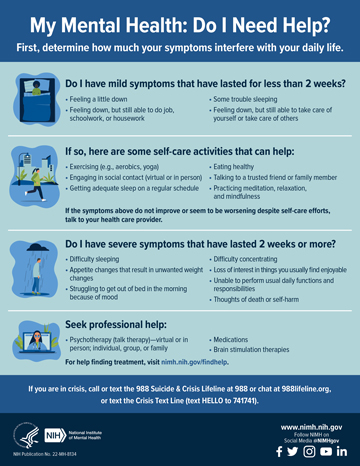
This image is property of www.nimh.nih.gov.
Seek Professional Help
Sometimes, improving your mental health may require professional support. If you’re struggling with persistent or severe mental health symptoms, it’s essential to consult a mental health professional. They have the expertise and knowledge to assess your condition and provide appropriate guidance and treatments.
Therapy or counseling can be incredibly beneficial for improving mental health. It provides a safe and confidential space to explore your thoughts, feelings, and concerns. A trained therapist or counselor can help you gain insights, develop coping strategies, and work through any underlying issues contributing to your mental health challenges.
In certain cases, medication may be necessary to manage mental health conditions. If a mental health professional recommends medication, it’s important to discuss any concerns or questions you may have. They can provide information about the benefits, potential side effects, and help you make an informed decision about whether it’s the right course of treatment for you.
Challenge Negative Thoughts
Negative thoughts can significantly impact your mental well-being. It’s crucial to practice positive affirmations, which involve replacing negative self-talk with positive and empowering statements. Repeat affirmations such as “I am capable,” “I am worthy,” or “I deserve happiness” to counteract negative thinking patterns and improve self-confidence.
Reframing negative thinking patterns is another effective strategy. Instead of focusing on the problems or obstacles, shift your perspective and look for solutions or opportunities. Train yourself to identify the positive aspects of a situation, no matter how small they may be. This shift in mindset can promote a more optimistic outlook and reduce feelings of hopelessness or despair.
Remember, challenging negative thoughts takes time and practice. Be patient with yourself and celebrate small victories along the way. With consistent effort, you can cultivate a more positive and resilient mindset.
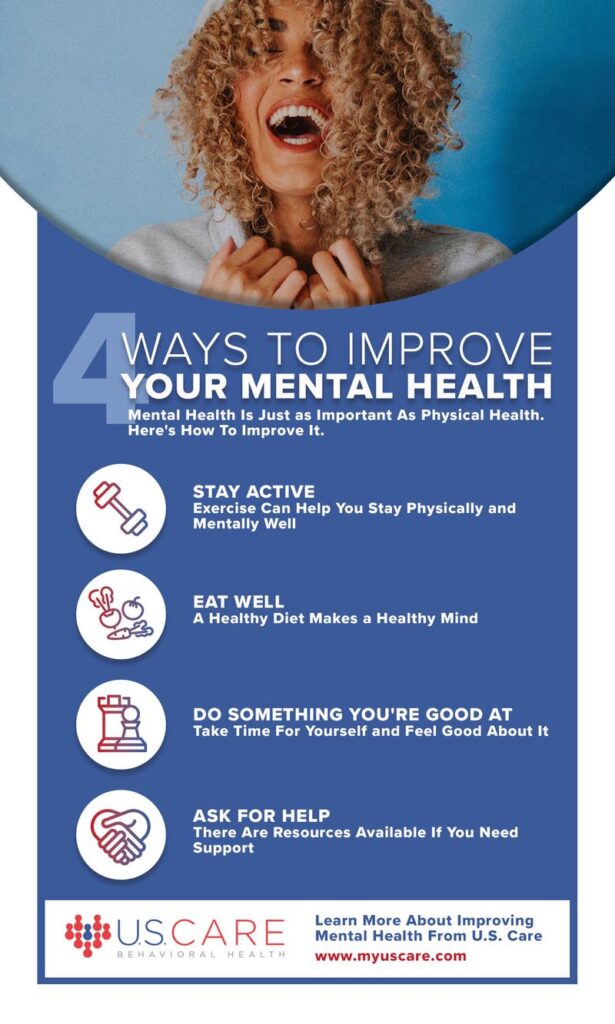
This image is property of static.mywebsites360.com.
Manage Time Effectively
Effective time management can greatly contribute to your mental well-being. Prioritize tasks by identifying what needs to be done and organizing them in order of importance. Breaking larger tasks into smaller, manageable steps can make them feel less overwhelming and more achievable.
Practice time blocking, which involves allocating specific time slots for different activities or tasks. This technique helps you stay focused and reduce procrastination. Set realistic deadlines for yourself, allowing for breaks and relaxation.
It’s important to remember that time management is not just about being productive. Allocating time for self-care activities, hobbies, and socializing is equally important. Balancing work, personal life, and leisure time is essential for maintaining a healthy work-life balance and overall mental well-being.
Maintain a Supportive Network
Surrounding yourself with positive influences and maintaining a supportive network is crucial for your mental health. Seek out friendships and relationships that uplift and inspire you. Engage in open and honest communication with your loved ones, expressing your needs, concerns, and emotions.
Don’t hesitate to seek help and advice when needed. Reach out to your support network when you’re feeling overwhelmed, anxious, or down. Having someone to listen, provide empathy, or offer practical assistance can make a significant difference in your mental well-being.
Remember, improving your mental health is a journey that requires consistent effort and self-compassion. By incorporating these strategies into your daily life, you can gradually enhance your overall well-being and cultivate a stronger and more resilient mindset. Prioritize self-care, seek support when needed, and be patient with yourself as you embark on this transformative journey towards better mental health.
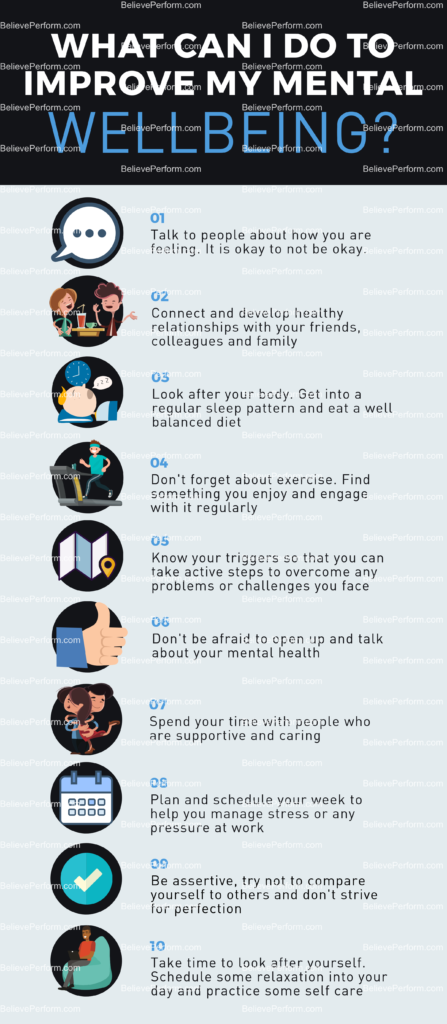
This image is property of members.believeperform.com.